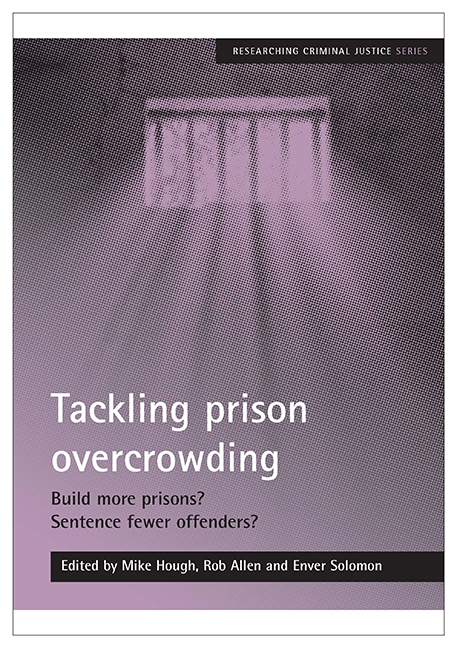Book contents
- Frontmatter
- Contents
- List of figures and tables
- Acknowledgements
- Foreword
- Notes on contributors
- 1 Introduction
- 2 The prisoners’ dilemma in England and Wales
- 3 Building on sand: why expanding the prison estate is not the way to ‘secure the future’
- 4 Towards more consistent and predictable sentencing in England and Wales
- 5 ‘Titan’ prisons: do size, efficiency and legitimacy matter?
- 6 Private punishment? An examination of the expansion, development and employment relations of private prisons
- 7 Reducing the use of custody as a sanction: a review of recent international experiences
- 8 Where now?
- 9 Endnote: latest developments in penal policy
9 - Endnote: latest developments in penal policy
Published online by Cambridge University Press: 25 March 2023
- Frontmatter
- Contents
- List of figures and tables
- Acknowledgements
- Foreword
- Notes on contributors
- 1 Introduction
- 2 The prisoners’ dilemma in England and Wales
- 3 Building on sand: why expanding the prison estate is not the way to ‘secure the future’
- 4 Towards more consistent and predictable sentencing in England and Wales
- 5 ‘Titan’ prisons: do size, efficiency and legitimacy matter?
- 6 Private punishment? An examination of the expansion, development and employment relations of private prisons
- 7 Reducing the use of custody as a sanction: a review of recent international experiences
- 8 Where now?
- 9 Endnote: latest developments in penal policy
Summary
Following the King's seminar, a flurry of proposals has emerged about sentencing and imprisonment, some of which have been produced during a period of heightened political and media concern about crime, in particular violent crime involving knives. The most significant of these proposals in the long term relates to the development of the sentencing commission discussed in Chapter 4. It is important too that in July the Sentencing Advisory Panel (SAP) launched a consultation into the principles which guide the courts’ decision making (SAP, 2008). Key questions include the circumstances in which custodial sentences should be imposed, what impact previous convictions should have on sentences, what weight should be given to all the different factors of an offence that might appear to make it more or less serious and whether the particular vulnerabilities of women offenders should have any impact on the approach to sentencing. The results of this consultation could exercise a profound impact on prison numbers and the prisons crisis. So too could a number of the other developments which have taken place between May and July 2008.The purpose of this endnote is to summarise these and assess the impact they might have on the future development of penal policy.
Growing criticism of Carter
The period since the seminar has seen growing criticism of the government's policy and the basis upon which it has been formulated. The House of Commons Justice Committee report, Towards Effective Sentencing, published on 22 July found Carter's review ‘deeply unimpressive’ and was concerned ‘that this review was not evidence based and was a missed opportunity. It should have considered how to develop new ideas to address the problems with sentencing and provision of custodial and noncustodial facilities in England and Wales’ (Justice Committee, 2008a).
A week earlier The Times newspaper published a letter from 10 leading parliamentarians, including former Conservative Home Secretary Lord Hurd, arguing that the decision to expand prison numbers was ‘taken by the Government without debate or the publication of any supporting evidence that other options had been considered and rejected. No arguments were produced to suggest that such a large prison population will make England and Wales a safer place to live in’ (The Times, 17 July 2008).
- Type
- Chapter
- Information
- Tackling Prison OvercrowdingBuild More Prisons? Sentence Fewer Offenders?, pp. 133 - 138Publisher: Bristol University PressPrint publication year: 2008



